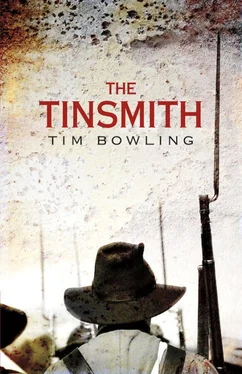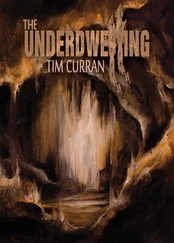“No!” he shouted. “Nooo!”
The women screamed. McElvane’s head shot away from the horse’s as the blacks’ poles hung in the air. In his effort to jump forward, John pulled Daney’s eldest son, Robert, down against him. But he kept his eyes on Daney. She held the ball cradled at her stomach and pulled the coffle toward the edge. It happened so quickly that the others had no chance to resist. Before McElvane could reach the ropes, all the women had gone over. Jancey had gone over. The ferry drifted away from the rapid sequence of splashes until the ferryman heaved an anchor into the current. The women’s screams continued for a few long seconds above the dog’s barking as the scow turned sideways. The broken water where the women had gone under quickly healed. Frantically, McElvane ordered the blacks to sweep with their poles.
“Try to catch hold of the ropes,” he shouted and bent so far over the edge that it seemed he must fall.
The ferryman rushed over with the lantern and pulled him back.
“Don’t be a fool, man,” he cried. “There’s no chance of getting them up in time.”
Robert was panting. He tried to pull the whole line of chains forward. But the men resisted. For his part, John was willing enough to join the women; at least he did not have the will to fight Robert’s grief. The face of Daney’s son was raw and tear-scalded. His eyes rolled back in his skull as he shouted for his mother and sisters. The ferryman ran to a wooden box near the chained dog and removed a shotgun. He trained it on the coffle.
“First one who wants to, dies.”
John helped to hold Robert still. McElvane continued to direct the blacks with the poles. “She can’t hold them all down,” he cried.
It was impossible to see where the water had been broken. “Oh, pray! Oh, pray!” repeated the old man, Motes, as the current flowed around the scow. The dog began to howl, and McElvane, looking conflicted, finally left the edge of the scow and calmed his horse before it bolted and plunged over the side with his cart full of iron. His face shook like paper being eaten by fire.
John stared at the calm, black surface of the river. They were all dead by now. Daney always said. Except no one but her had made the separation. That was what she must have thought. They were all dead, still roped together, the iron ball spilled from Daney like the dead weight of all the children that could not be ripped from her by other hands.
• • •
The river flowed black and smooth, and the last shreds of mist and lantern light flickered over it. He touched his cheek.
Dare felt the fish hook bit of scar that stuck out from the top of his beard onto his bare skin. The mark remained, but the two letters were gone, the chains were gone, he held in his uncuffed hands a set of oars. And the shotgun, just visible in the grainy dusk, appeared to shine and rise before him in the air.
The Englishman had begun to cross the boundary.
July 1881, Chilukthan, British Columbia
The days passed quickly now, though fractured and fraught. Anson attended Louisa much of the time, for in her presence he did not feel such urgency about reuniting with Dare. But his concern for the girl would not let him relax. Evenings were the worst, and he fell naturally into the same broken rhythm that he’d known at Antietam, snatching an hour or two of sleep and walking to keep himself alert.
Suddenly, one morning, the settlement took the girl’s fever into itself. It wasn’t only the days lengthening and the sun burning brighter and hotter; it was the general pace of activity. Down at the cannery, in the mix of shadows and sunlight on the rough-planked wharves outside each building, the barefoot Indian women spent endless hours hunched over piled tresses of linen, expertly weaving them into gillnets. Anson watched in amazement as their brown hands butterflied among the meshes; these women, short and stocky for the most part, mild and silent, with their shy smiles and fondness for colourful beads, ribbons, and braid work, turned into regular demons of industry with wooden hanging-needles in their grasp. Meanwhile, more great cedar canoes, elaborately carved with designs of various totemic creatures—bears, ravens, wolves, and killer whales—slid into the landing almost by the hour, bringing more men and women to pull the nets and row the fishing skiffs, more barely clothed children, noses green and running, to roam the muddy banks, and more scrawny, mixed-breed dogs to fill the sultry silence with their barks and howls.
Behind the main cannery building, the Chinese had stopped punching out cans. The absence of the thunking sound on the air was somehow unsettling, as if the heartbeat of the entire coast had stilled suddenly, replaced with the erratic, wandering pulse of the dogs’ hunger.
There were darker changes too. Without telling anyone, the Chinese coffined one of their own and placed the plain box high in a fir tree, as apparently was their habit. Gold Mountain, the China Boss said when pressed for an explanation, gone to Gold Mountain. Fair enough, Anson thought, they could call heaven whatever they wanted, but he needed to know the cause of death because there was always a danger of epidemic. If the Chinaman had perished of typhoid, for example, the situation was suddenly more grave. Typhoid was highly contagious, but as long as he restricted Louisa’s visitors to those relatives who had already been exposed to the disease, Anson felt confident he could keep it from spreading. But after considerable awkward entreaties had led the Chinese to lower the box and open it, Anson discovered that the man, so emaciated as to be only transparent skin over bone, had likely died of nutritional lack, probably of scurvy. He ordered the Lansdownes to make sure some vegetables were added to the meagre rice meals at the China House, but Thomas, at least, was unmoved by the death.
“I’ll have to get another Chinaman,” he muttered and lowered his shoulder into the heated air as if trying to break through an invisible door.
With the excitement of the big run playing on everyone’s nerves, drink suddenly became a problem. Where the alcohol came from was never clear to Anson, but the effect was obvious enough, as several of the male Indians spent their non-fishing hours with the bottle, which led to games of chance that sometimes ended in violence. On two occasions, Anson had been called from Louisa’s bedside to stitch wounds, one from a broken bottle, another from a knife.
The comings and goings at the settlement began to blur; everything became caught up in the tidal flow. The self-righteous Southerner, Richardson, took the steamer to Victoria, though not before vowing mysteriously that he’d return soon “to help ease the family’s sorrows.” The fiscal agent had crawled onto the scene like a colourful rat, and Anson had done his best to avoid him, which wasn’t difficult, since, upon hearing of the child’s illness, the agent immediately hired some Indians to row him to New Westminster.
Much more dramatic than these various events, however, was the sudden arrival of the big salmon run. The fish had struck the rivermouth in numbers greater than anyone had known. Instantly the cannery’s belts and wheels and gears smoked and whirred as the now-sober fishermen returned with their skiffs heaped to the gunwales with rippling silver. The sun bloodied. The air filled with the stench of dead fish and guts as the cannery spewed offal into the river. Great swirling clouds of gulls shrieked constantly. It was an assault like nothing he’d ever seen, and Anson was sorry he could not spend more time watching the deft skills of the Chinese and Indians who slit and gutted the fish and fitted the deep-red sections into cans.
Читать дальше












